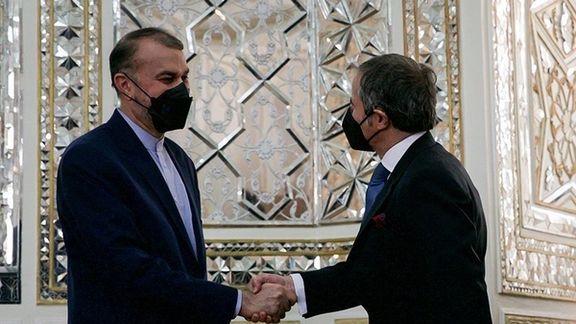UN Nuclear Chief Ends Iran Trip With Questions Left Hanging

The UN nuclear chief and Iran’s foreign minister stressed commitment Tuesday to continue cooperation but gave no sign that outstanding issues had been resolved.

The UN nuclear chief and Iran’s foreign minister stressed commitment Tuesday to continue cooperation but gave no sign that outstanding issues had been resolved.
Hosting Rafael Grossi in Tehran, Foreign Minister Hossein Amir-Abdollahian said Iran had “serious will” for “interaction” with the International Atomic Energy Agency (IAEA) “in the framework of the monitoring agreements,” the official news agency IRNA reported.
The foreign minister was apparently referring to both Iran’s cooperation with the IAEA within Nuclear Non-Proliferation treaty and a temporary arrangement, made first in February and extended in September, giving nuclear inspectors greater access. IAEA chief Grossi had said Iran has broken the terms of the September agreement by barring the agency from the Karaj plant, west of Tehran, which makes parts for Iran’s nuclear program.
Neither Grossi nor Amir-Abdollahian commented on another IAEA concern, its dissatisfaction over Iran’s explanations on uranium traces found at three sites not declared as nuclear facilities.
Grossi’s visit came shortly ahead of the scheduled resumption of talks in Vienna between Iran and world powers, due November 29, over reviving Tehran’s 2015 nuclear deal (the JCPOA, Joint Comprehensive Plan of Action), under which it limited its atomic program in return for the removal of international sanctions. The Vienna talks have been in abeyance since June.
While the IAEA would monitor Iran’s compliance with a revived JCPOA, Grossi’s more immediate task has been to continue agency inspections at a level he says allows effective monitoring. Tehran reduced IAEA access in February to that required under the NPT while subsequently agreeing a more favorable temporary arrangement.
"The agency is seeking to continue and deepen the dialogue with the government of Iran ... We agreed to continue our joint work on transparency and this will continue," Grossi told a televised news conference.
Amir-Abdollahian said that technical cooperation with the IAEA had “suffered because members of the JCPOA had not clearly acted against attacks on Iran.”
The Karaj facility was reportedly hit June by a drone attack, one among several incidents widely attributed to Israel. Iran has justified barring IAEA inspectors from the site, where they want to service monitoring equipment including cameras, because a review of security is underway.
Iran has long expressed frustration at the failure of European JCPOA signatories − France, Germany and the United Kingdom − to counter the ‘maximum pressure’ sanctions introduced by former United States president Donald Trump when he left the JCPOA in 2018. But since President Joe Biden took office in January, the US and Europe have moved closer together, and Europe has become more outspoken over Tehran’s expansion of its nuclear program beyond JCPOA limits and its restricted co-operation with the IAEA.
The Vienna talks formally involve the remaining JCPOA members – the three European states, Iran, China and Russia. The US takes part indirectly. Israeli Prime Minister Naftali Bennett said Tuesday that Israel would not feel bound by a renewed Iranian nuclear deal.